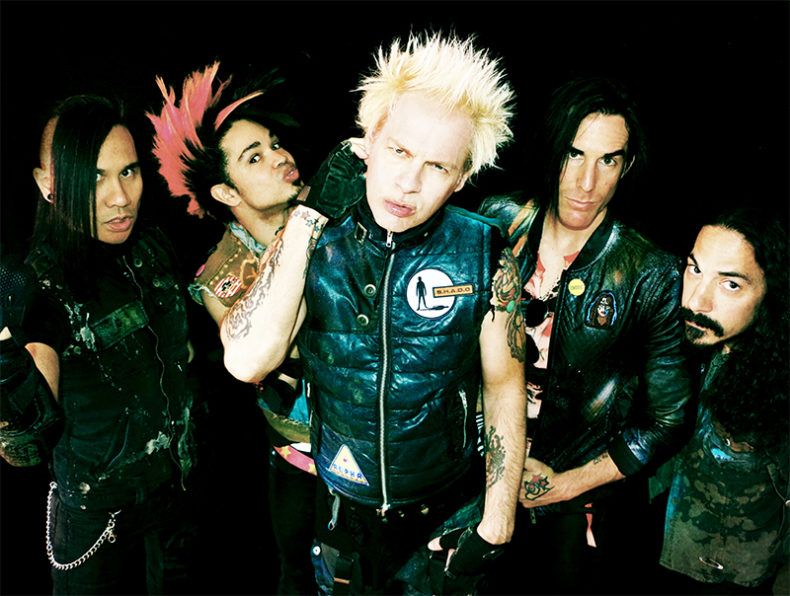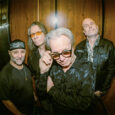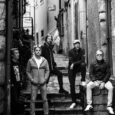BE YOUR OWN ISLAND
A CONVERSATION WITH WITH SPIDER ONE – VOCALIST OF POWERMAN 5000
Powerman 5000 began soon after founder and frontman Spider One dropped out of the prestigious School of the Museum of Fine Arts in Boston, Massachusetts. ‘I loved painting,’ Spider recalls, ‘but I figured I could do that when I was 80. I was spending all my time in the clubs of Boston, like the Rat and the Channel. I was watching all of these great local bands and I wanted to be a part of that scene! So I dropped out of school without a clue but was determined to start a band.’ As Powerman 5000 prepared to release their latest onslaught, New Wave, in fall of 2017 with Pavement Music, Spider sums it up this way, ‘After all these years, I feel like the band gets better with every record and tour. I’ve never lost the enthusiasm that I had from those early days and always want to treat each new album as if it’s our first. I’m not interested in the past, just creating the future. A big, loud, crazy future!’ I had the opportunity to chat with Spider ahead of the festive holidays.
As the band had come quite a significant distance since their debut album release, I was keen to find out if his personal vision for the band had changed since the release of that album way back in 1994. Spider mused carefully before replying that since he had started the band twenty-plus years ago that it was very much of a DIY work ethic. That did not change whether the band were on an independent or a major record label. He had grown up with a very punk-rock mentality, so that spirit had always stuck with him: doing everything yourself and not following or being told what you should do. He stated that in those terms nothing had really changed, and that his approach remained the same way. However, he elaborated that every time he made a record that it is a snapshot of where his head is at in a particular moment. Stylistically, it could change a little bit, but it was important to know what you do best and just try to do it better every time that the band makes a new record. Personally, he tries to stretch out a little bit on every record, but also at the same time understand who you are at the core and as a band.
I was keen to find out Spider’s views on why Powerman 5000 as a band was still surviving in a difficult and much-changed musical climate. He laughed before attributing the secret of longevity to ‘not stopping.’ He stated that a lot of bands just break up, or give up before they actually should. He described the whole experience of being in a band as akin to a rollercoaster ride. Starting at the bottom, and then you hopefully get some success before finding yourself going both up and down over the years. He emphasized the importance of having self-belief and drive ‘because you love doing it.’ He stated that it was important to realize that every year presented a fresh set of challenges, and that at the same time it was also a bit of an ego check. Spider likened it to anything else in life, in that some people tended to give up easily if they found themselves not in the same position as to where they once were. But not him, as he said, ‘Until the day that I wake up and decide that I have nothing left to contribute or that it is just not fun anymore I will keep doing it.’ I also felt that the band being particularly difficult to label or categorize certainly would have made it more difficult to have and sustain a long musical career.
Spider agreed slightly, but also felt in another way that it had also aided them. ‘We have never been a band that have lived and died with a trend.’ He felt that Powerman 5000 had always been a band that had a foot in different camps in terms of musical styles and labels. The band has been adaptable and able to tour on the Ozzfest or with Metallica or Pantera, but at the same time he felt that they are ‘not a metal band.’ He felt that they can exist both in the world of metal and at the same time exist in a lot of other worlds. Spider was of the opinion that the band was not just the product of his own eclectic taste in music, but that it also took influence from whatever band members were into at a particular time. From the outset, it had always been a musical melting pot of styles and ideas. He had tried to maintain that, but in a cohesive way. Speaking personally, Spider said that he had always personally favoured bands that did not fit neatly into a particular category. ‘Sometimes it is easier to fit in with a trend or style.’ He emphasized further that he had always been of the mindset of being your own island.
I wondered if this particular belief had contributed heavily to the many musicians that had passed through the ranks of the band over the years. Spider paused before stating that he felt that there had been a lot of reasons for that. He felt that keeping a band together was a difficult thing. Starting a band, you always have a personal vision that the original lineup will always endure. However, that is actually a very difficult thing to pull off. Losing band members or why people quit or get fired cannot be solely attributed to a single reason. Spider, instead of seeing those times as a weakness, chose instead to view them as a strength. Despite changing the band’s consistency, he felt that it also keeps things interesting and fresh, because introducing somebody different to the band brings a new energy and a new musical perspective. Thus, it is inevitably going to make the band cooler and more exciting. Spider felt that he was now at the point where he currently had band members that had grown up as fans of the band. That in itself brings another level of excitement to the band. He felt that every single band member that had come and gone had their own individual story as to why that had happened.
On the new album, Spider had referenced some musical heroes such as Bowie and Sid Vicious. Did he actually feel that the current music scene had any heroes or that the era of the musical hero and icon had gone perhaps forever? Spider felt honestly that everyone relates to stuff that they grew up with and has a particular affinity or affection for. People always tend to look at things currently but always yearn that it wasn’t as good as how they remember it. He did feel, however, in relation to American rock music, that it currently offered little appeal. Growing up, his own musical heroes had been people like Bowie, The Sex Pistols, and bands that had intentionally tried to challenge an audience. Today, especially with American bands, Spider felt that the opposite is true — there is a pandering to the middle. Nobody stands out, looks strange, or talks about anything controversial. It is just boring. Growing up, he wanted to find musical heroes that felt like they were from another world. They knew something that he didn’t know, and he could actually learn from that. Listening to The Clash at the age of thirteen, he didn’t really have an understanding of the politics and stuff that they were writing and singing about. However, they did convey to him a sense of importance, and that sparked a sense of curiosity deep within him. Spider agreed that there was a real lack of that in today’s rock music. He wished for a bit more extremism in the music scene today, not that it had to be particularly shocking, but rather that there should just be people with ideas that are more challenging.
“Until the day that I wake up and decide that I have nothing left
to contribute or that it is just not fun anymore I will keep doing it.” ~Spider One, December 2017
We had earlier discussed the enduring quality and longevity of Powerman 5000, but I was keen to find out how Spider personally viewed his own musical legacy . . . Was he proud of what he had created, or instead did he prefer to focus on what was ahead? Spider preferred to look ahead, ‘I try not to think about what we’ve done — I try to think more about what I can do.’ He stated that people generally didn’t view themselves in that way, but instead left it for others to view them in that manner. However, he admitted that he felt that himself and also the band tended to be a bit misunderstood. Due to the type of music that they came up with at the band’s inception, people assume that Powerman 5000 is just like a dumb nu-metal band. However, people that have paid attention will get the nuances and subtleties and also the influences that go into what the band actually does. He felt that there is a bit more depth than people actually give them credit for. He did recognize that there is no control over how you or your band are perceived, saying, ‘You can only do what you do and hope that some people get it.’
The band, I do feel, however, has crossed over to the general public’s consciousness through the use of their music, which has been widely featured in various media soundtracks, TV, and video games. Spider stated that it had been a definite plan to do that. The band had taken a different approach and stance to that. These days, bands are more comfortable with allowing their music to be used in that way, but there had been a time when that was certainly not the case. Spider instead viewed that as an opportunity just to have someone hear the band’s music. He didn’t claim to foresee the changes in the industry, but it was actually proved correct. Today, bands are always scrambling for new ways to have their music heard. The traditional view was not to allow your music to be used in any movie, etc. Spider instead felt that there was no bad way to discover something new. This attitude summed up the band and was always a big part of what they did. He did understand how some could see it as a form of commercialism or sellout, but he felt that if you are doing anything just for money or to gain some popular status you are going against your natural beliefs. That situation could be a wrong move — however, for Spider, he always felt that video games and movies were something that is actually part of rock culture. In his eyes, therefore, ‘it made perfect sense.’

Powerman 5000 has toured intensively since they first started out and always seem to be on the road. I was curious to discover if they only saw the inside of the tour bus and then the venue themselves, or if they had actually taken the opportunities afforded to them over the years to experience different cultures and countries. Spider thought for a few moments before singling out Japan as being one country that he had personally found exciting. As a kid, he had grown up with a particular interest in Japanese movies and media. He felt more than any other place that they had toured it had seemed like it was another world. Playing at a club on the 50th floor of a building was given as an example; he found it personally exciting when parts of Tokyo looked like a scene from the movie Bladerunner. Spider also referenced a trip to China as being particularly memorable. About to play a sound check at one venue, all these hundreds of uniformed security marched in — which initially was very imposing before he discovered that they were all young kids who were excited just to see the band. Every country he stated that they had visited presented its own particular highlights. Spider highlighted a particular tour of Europe during which they had played at some major festivals including Download and Hellfest. The enthusiasm of the audiences for music and a variety of music had stood out for him, about which he stated that he didn’t feel so much in America itself. He felt that it was particularly encouraging to see that, especially after his earlier comments on the state of the current American rock scene.
Music has gone through many changes, as indeed has the music business since Powerman 5000 started. Is technology something that Spider embraces or reluctantly accepts? Laughing, he replied, ‘it depends on the day’ before he went on to elaborate that being in Powerman 5000, he had spent the same length of time doing things the new way as he had spent doing things the old way. For a while he wanted to fight it, as a purely natural instinct to hold on to what you are used to. At the end of the day, there are both good and bad things, but he has learnt to accept change, believing that he can’t allow himself to be just caught up in the past or he will just get left behind. He embraces what he finds important about it, but he also doesn’t think that it is has yet to transform music or the way the music business is run to make it as exciting as it used to be. Spider felt that it used to be like putting out the album was very exciting. There were certain things that happened if you achieve them. It was like a big deal, whether it was getting a video on MTV or whether it was, you know, getting your record on Tower Records. There were certain things like these achievable tangible things that were really exciting. ‘And now it’s kind of like I can’t really get that excited about getting on a playlist on Spotify.’ He fully recognises that it’s important that there is a new way, but it’s not that great either. There are other alternate sources of revenues available to bands, such as touring, which is their primary source of income compared to vinyl and CD sales.
Changed times and a very different musical climate compared to when Powerman 5000 first started, but I guess with musicians like Spider, as long as you hold dear your own personal beliefs and principles, then you will always survive.










